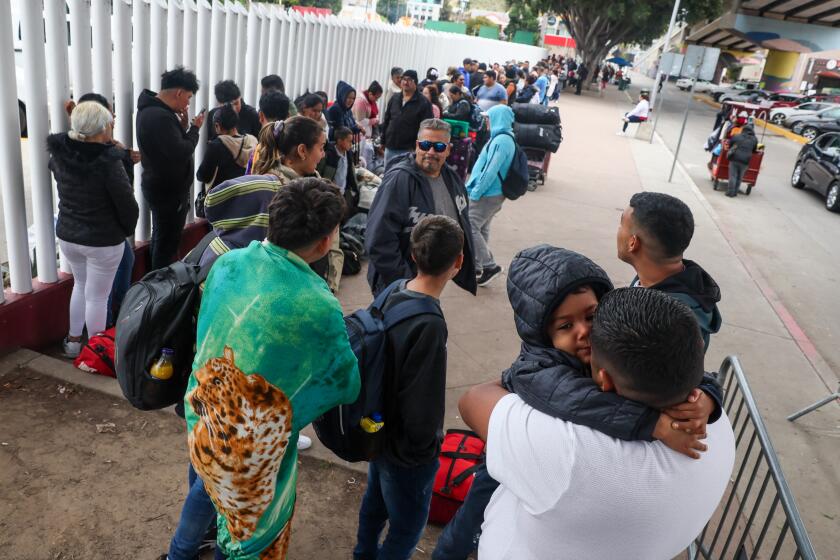Migrants Snared by Crackdown on Terrorism Since Sept. 11 Attacks
Javier Hernandez, 38 and clean-cut, stood beside a rusty, corrugated-metal fence, gazing at a Sketcher’s outlet, a McDonald’s and a Ross Dress for Less only yards away -- in California.
Hernandez has crossed the border illegally 16 times and, since 1995, has made his home in San Jose, where he welds fans, window frames and gates. Earning $24 an hour, he sends $400 a week to his family in Mexico City, enough to put his four children through private school.
After Sept. 11 prompted a U.S.-Mexico border crackdown, Hernandez canceled his yearly visit home for Christmas, realizing that it would be difficult to return to California. Last December, he went back to Mexico City and told his family to pack their bags.
But 10 months have passed, and the family remains in Mexico. Hernandez found the routes he normally traveled along the Texas and California borders swarming with Border Patrol agents. A smuggler who agreed to take the family through the desert disappeared with $1,600.
And Hernandez remains behind the fence.
“This is all because of [Osama] bin Laden,” he said. “It’s his fault, not ours.”
A crackdown on immigrants’ routes along the southern U.S. border, launched a decade ago, intensified after the Sept. 11, 2001, terrorist attacks caused U.S. officials to wonder that if migrants could get across the border, terrorists could too.
But although an Associated Press investigation found no evidence that the crackdown resulted in the capture of a single terrorist, it turned up plenty of signs that the trip has become more arduous for millions of desperate migrants heading north in search of a job.
Academics and migrants say now that crossing is more difficult, many migrants spend extra time in the U.S., often sending for their families rather than fetching them themselves.
That has caused migrants’ routes to fill with women and children -- even newborn babies -- making the trip to join husbands and fathers already in the United States.
Bandits prey on these migrants along the border, robbing and raping them as they pass through remote, unpoliced areas.
Children are especially susceptible to dehydration and heat stroke in the days-long walk through the desert to reach pickup spots.
“Before Sept. 11, minors could travel with their families, but not anymore. Parents would come down to get them, but now the trip is too difficult,” said Oscar Escalada, director of a Tijuana shelter for migrant children.
The shelter has taken in 3,903 minors -- all traveling alone -- since Sept. 11, 2000.
Children who travel with their parents are using ever-more-dangerous routes through the desert. Mikaela Hernandez, 21, trudged through the Arizona desert with her children Zaira, 2, and Ivan, 8 months, trying to join her husband in Arkansas.
Bandits stole all but the 50 pesos -- $4.50 -- that she hid in her baby’s diaper as she crossed into the U.S., and her water ran out two days into the trip. After three days lost in the desert, she turned herself in to Border Patrol agent Rob Kiernan.
“Tell her I would put her in jail if I could for endangering these kids,” Kiernan told a journalist.
Hernandez just clutched her baby and stared at the ground.
More to Read
Start your day right
Sign up for Essential California for news, features and recommendations from the L.A. Times and beyond in your inbox six days a week.
You may occasionally receive promotional content from the Los Angeles Times.






